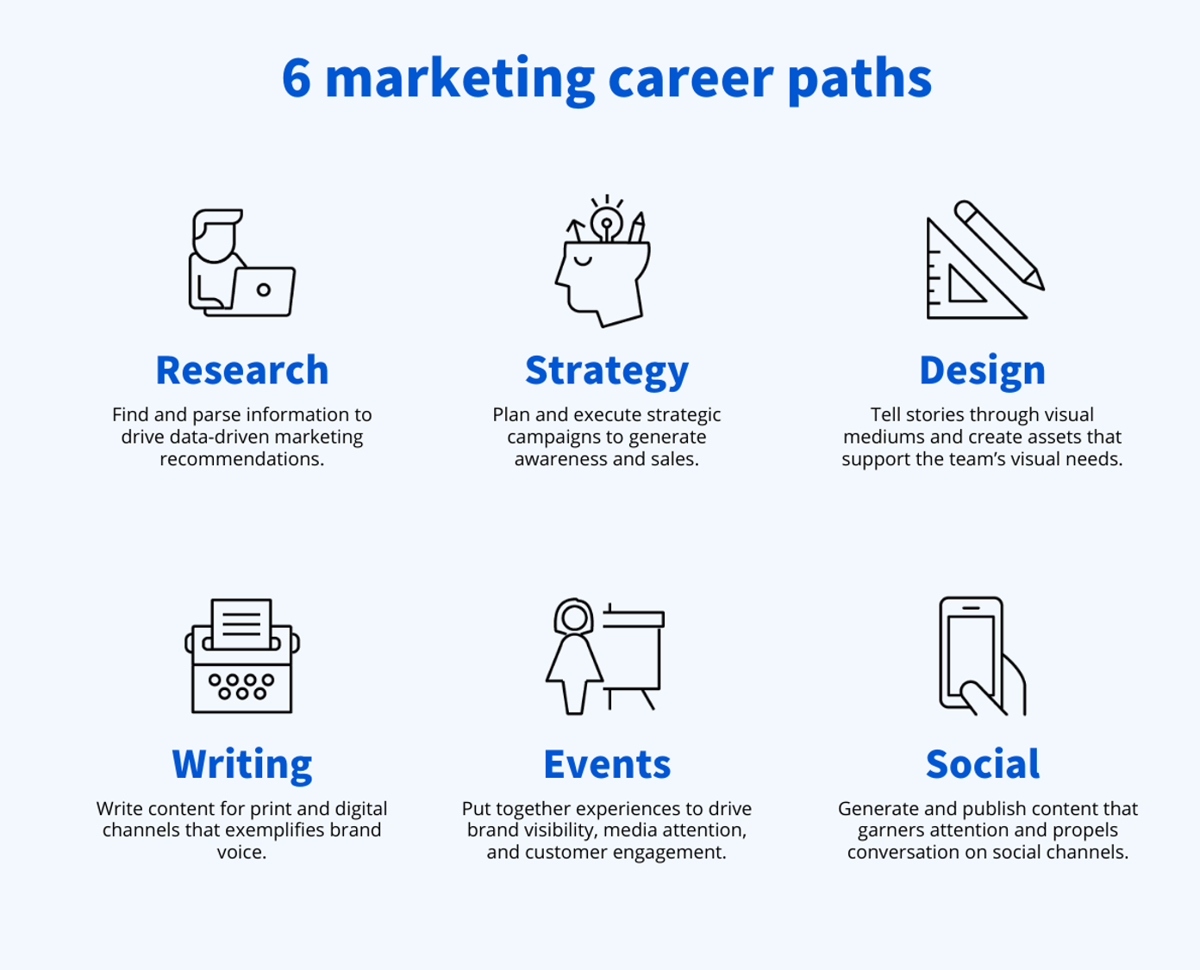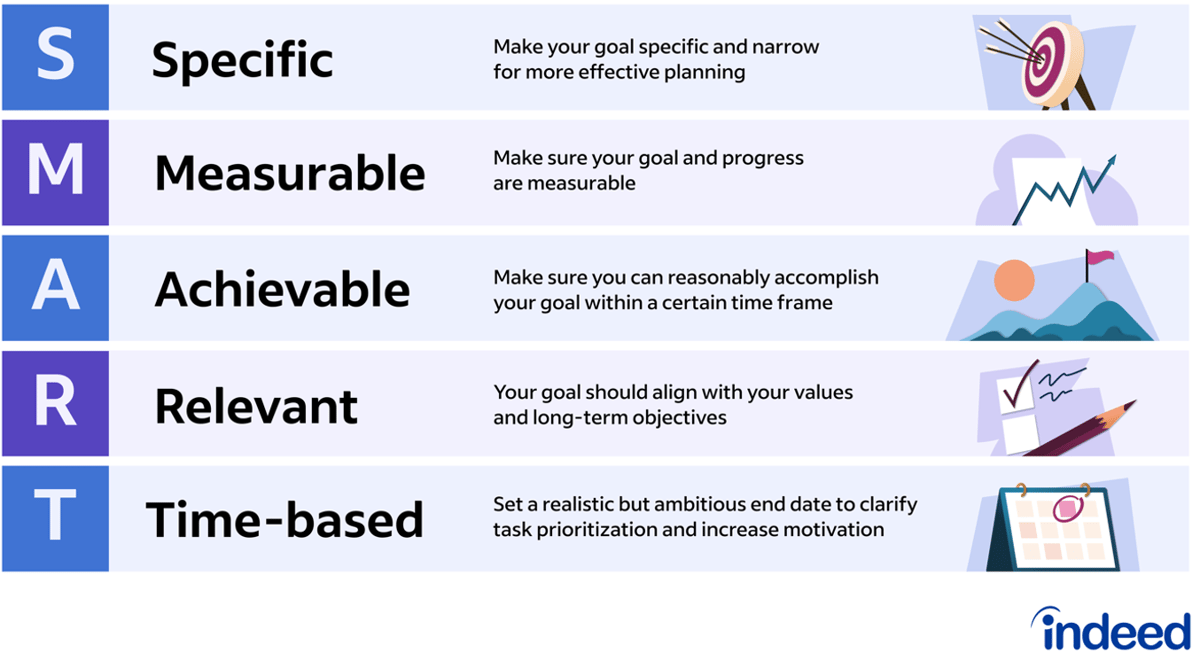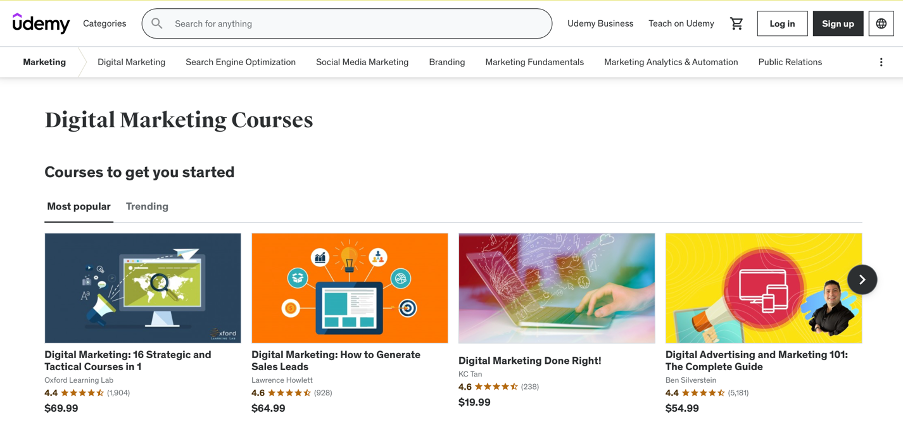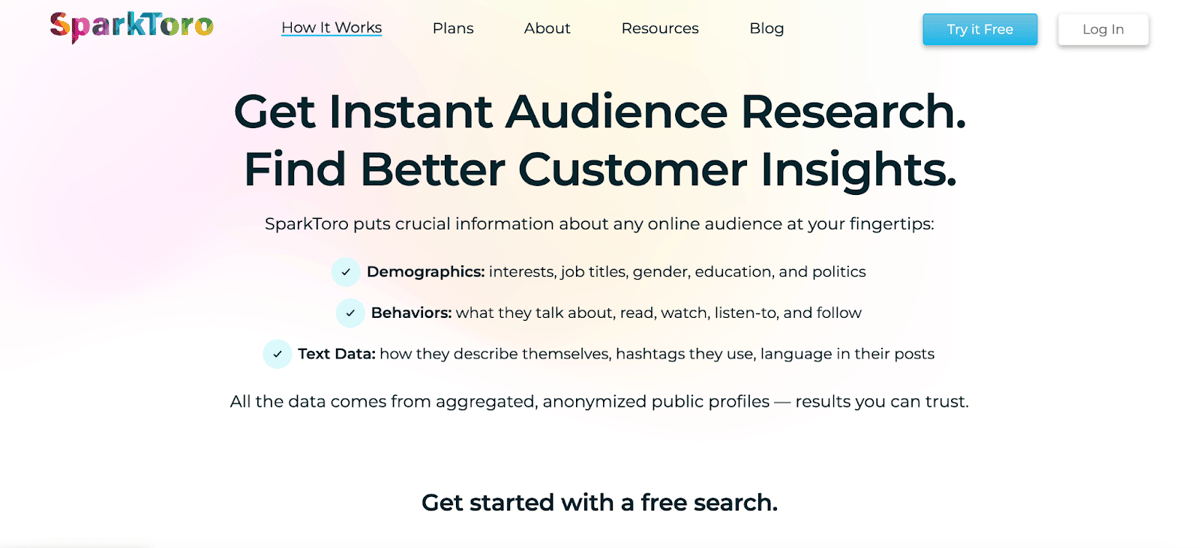It's no secret that being a marketing specialist is sometimes overwhelming since the marketing sphere offers ambitious individuals a diverse and exciting career path. From my experience, navigating this broad landscape with a clear destination can be easy. That's where setting effective career goals comes in.
Importance of setting career goals in marketing
Setting the right career goals in marketing provides some kind of a roadmap for professional development. The right goals provide direction, give motivation, and help you make good decisions that shape your future in the field. Whether climbing the corporate ladder, mastering a particular skill set, or venturing into entrepreneurship, well-defined goals guide marketers toward success.
Overview of the career path in marketing
The marketing field offers diverse career paths, each catering to different skill sets and interests. Marketers can explore various roles and specializations, from traditional advertising to data-driven analytics, based on their passions and expertise. Some common career paths in marketing include 6 paths:
1. Research:
Think of marketing research like detective work but with data. You're digging into what people want and need, using all sorts of cool tools to figure it out. This could be your jam if you're into analyzing stuff, finding patterns, and telling stories with numbers. Additionally, handy tools like Google Sheets templates can streamline your data organization and analysis processes, making it much more pleasant.
2. Strategy:
This is where you get to be the mastermind behind the scenes. Imagine you're plotting a heist, but instead of stealing, you're trying to win people's hearts with killer campaigns. It's all about creating fresh ideas and plans to get the word out about a product or brand.
3. Design:
Do you know those awesome logos, web pages, email signatures, and Instagram posts that catch your eye? Yeah, that's the work of designers. This could be your playground if you're into making things look cool and telling stories through visuals. There are plenty of options in this field, such as graphic design, UI/UX design, web design, and front-end services for turning designs into interactive experiences. With tools available today, you can even create logo with AI, making the logo design process faster and more accessible for beginners and pros alike. As businesses prioritize seamless user experiences, hiring React developers has become essential for building responsive, high-performance web applications that enhance customer engagement.
4. Writing:
Words are your weapon in the marketing world. Whether it's crafting catchy taglines, writing blog posts, or even scripting videos, if you're good with words and love storytelling, you might find your niche here.
5. Events:
Picture this: you're throwing the party of the year, but instead of confetti, you've got branding and engagement goals. Event marketers are all about creating experiences that people remember. This could be your scene if you're into planning, organizing, and making things happen. Thank God plenty of AI scheduling tools and dedicated scheduling apps make planning so much easier. Employing dynamic etix pricing in event marketing can significantly revolutionize your sales strategy. Event marketers can maximize attendance and revenue by understanding and responding to consumer demand, leveraging real-time data, and tailoring prices accordingly.
6. Social:
Welcome to the land of tweets, likes, and shares. Social media marketers are the cool kids who know how to make waves online. If you're all about crafting engaging content, keeping up with trends, moderating user-generated content effectively, and being a brand's voice, you might be a social media guru.

So there you have it—a rundown of the marketing world. Whether you're crunching numbers, dreaming up big ideas, or crafting the perfect tweet, there's a spot for you in this crazy, creative industry. So, find your passion, hone your skills, and prepare to make your mark in the marketing world!
Starting in Marketing
Exploring different roles and job opportunities in marketing
For people starting in marketing, exploring the many different jobs is crucial. Doing some digging, checking out industry events, and chatting with pros can give you a good idea of what's out there. It's all about finding what you're into and where you excel!
Gaining relevant skills and experience
Once you've figured out your career goals, it's time to focus on building up your skills and experience. Whether it's hitting the books, grabbing internships, or learning on the job, marketers need to keep improving their toolkit to stay ahead in this fast-paced industry. Even reviewing your first paystub from a marketing internship can give insight into how roles are compensated and help you understand how marketing work translates into real-world value. That means learning digital marketing tools, polishing your communication skills, and getting comfortable with data analysis and interpretation. It's all about staying sharp and ready for whatever comes your way in the marketing world!
Building a professional network in the industry
In marketing, forming and maintaining professional relationships can pave the way for fresh opportunities and partnerships. Networking helps marketers connect with peers, mentors, and possible employers, offering access to valuable tips, guidance, and career openings. Showing up at conferences, getting involved in pro groups, and jumping into online communities are top-notch ways to grow your network and make your mark in the field. When you meet new people, a modern digital business card can be a great way to make a lasting impression. It's a convenient and eco-friendly alternative to traditional paper cards, letting you share your contact details and professional links instantly with just a tap of a phone.
Have any questions? Need a career consultation? Book a mentor session with me at MentorCruise!
Goal Setting for New Marketers
SMART goals: Specific, Measurable, Achievable, Relevant, Time-bound
SMART goals are designed to make goal setting more effective and actionable. Let's break down each component:
- Specific: Your goals should be clear and well-defined. Instead of setting a vague objective like "increase sales," specify the target audience, product/service, and desired outcome, such as "Increase online sales for Product X by 20% within the next quarter."
- Measurable: Establish criteria for measuring progress and success. Quantifiable metrics enable you to track performance and evaluate the effectiveness of your strategies. For instance, track metrics like website traffic, conversion rates, or social media engagement.
- Achievable: Set realistic goals that are within your reach. Consider your resources, skills, and constraints when defining objectives. While it's essential to challenge yourself, setting unattainable goals can lead to frustration and demotivation.
- Relevant: Ensure your goals align with your career aspirations and organizational objectives. They should contribute to your professional development and the overall success of your marketing initiatives.
- Time-bound: Set deadlines to create a sense of urgency and maintain focus. Establishing a timeline helps you prioritize tasks and allocate resources efficiently. Breaking down larger goals into smaller, manageable tasks with deadlines can make them more attainable. In fast-paced team environments, a tool like the employee scheduling app Agendrix can further support this structure by reinforcing accountability. It helps track work hours, attendance, and schedules—ensuring that everyone stays on track and aligned with timelines.

( Image source)
Setting short-term and long-term goals in marketing
In marketing, balancing short-term goals with long-term strategic objectives is essential. Short-term goals are like the quick wins that keep things moving—things like boosting your social media followers, launching a new ad campaign or tweaking your website to perform better. These little victories build momentum and set the stage for bigger successes.
On the other hand, long-term goals are the big dreams — the ones that define your career path. We're discussing landing that marketing manager role, mastering a specific skill set, or leading a major marketing initiative. These goals take time, dedication, and ongoing learning to achieve.
By setting a combination of short-term and long-term goals, you create a balanced approach to career advancement and professional growth in marketing.
Professional Development in Marketing
Continuous learning and staying updated with industry trends
Continuous learning is crucial for marketers to stay relevant in the ever-changing marketing landscape. Marketers must adapt and acquire new skills as technologies, consumer behaviors, and market trends evolve.
Staying updated with industry trends involves actively monitoring changes in marketing, such as emerging technologies, shifts in consumer behavior, and evolving best practices. By staying informed, marketers can anticipate trends, identify opportunities, and adjust their strategies accordingly.
Engaging with industry publications, blogs, podcasts, and social media channels helps marketers stay abreast of the latest developments. Attending conferences, webinars, and networking events also provides valuable opportunities to learn from experts, share ideas, and stay connected with peers.
Utilizing professional development resources and courses
In today's digital world, marketers have many resources to level up their game. Online platforms like LinkedIn Learning, Coursera, and Udemy offer various courses on digital marketing, content strategy, social media, and data analytics.

But they don't stop there! These platforms also dig into handy marketing tools and software, from analytics platforms to social media management tools and contract management software.
Besides hitting the books, getting a mentor or coach is gold in the marketing game. Chatting with experienced folks can give you awesome tips, feedback, and support to hustle and grow in marketing.
Overcoming Challenges in Career Growth
Let's talk about the real stuff—the hardships we face as marketers trying to climb that career ladder. It's not all smooth sailing, but that's part of the game. Know when to move on to a new job and always make sure you are upskilling and learning from mistakes. To increase your chances for new roles or promotions, update your resume with Rezi ATS-friendly resume templates so your skills and achievements stand out from the crowd.
Dealing with setbacks and reevaluating goals
Yep, setbacks happen. You launch a campaign, put your heart and soul into it, and... bummer. It's disappointing, sure, but it's also a chance to regroup and return stronger. Take a step back, reevaluate your goals, figure out what went wrong, and learn from it. That's how we grow in this crazy world of marketing.
Managing work-life balance in a demanding industry
Ah, the eternal struggle of balancing work and life. In marketing, it's easy to get sucked into the whirlwind of deadlines and projects. But you know what? It's okay to take a breather. Set boundaries, carve out time for yourself, and remember to disconnect occasionally. Trust me; your sanity will thank you.
Developing resilience and perseverance
Marketing can be a rollercoaster ride of highs and lows. That killer campaign you worked on for weeks? It might flop. But you know what separates the winners from the quitters? Resilience and perseverance, my friend. Embrace the setbacks, bounce back stronger, and keep pushing forward. That's how we roll in this game.
So, there you have it—some of the challenges we face in marketing and how to tackle them head-on. It's not always easy, but isn’t it worth it?
Case Studies: Successful Marketing Professionals
Success stories like that of Rand Fishkin, the co-founder of Moz and SparkToro, provide valuable lessons for those looking to establish effective career goals. Fishkin's journey from a college dropout to a prominent digital marketing figure is inspiring and instructive for aspiring professionals.

Fishkin's marketing career kicked off in the early 2000s when he joined his mother's marketing firm and co-founded Moz in 2004. His innovative strategies at Moz revolutionized SEO and inbound marketing, setting the stage for his influential presence in the industry.
What sets Fishkin apart is his commitment to transparency and authenticity. Through his blogs, speaking engagements, and books, he openly shares experiences, successes, and failures, earning him a reputation as a trusted thought leader.
A pivotal lesson from Fishkin's career is aligning career goals with personal values. He emphasizes customer-centric approaches and ethical practices, highlighting the significance of building trust for long-term success.
Fishkin's openness about mental health struggles is another relevant aspect for marketing professionals. Acknowledging and addressing mental health is vital, especially in high-pressure industries like marketing, where access to mental health EHR systems can support professionals in managing their well-being more effectively.
His latest venture, SparkToro, reinforces Fishkin's dedication to innovation. This market research tool empowers businesses to identify target audiences and refine strategies based on data and insights from social media and online platforms.

In conclusion, Fishkin's journey is a blueprint for a successful marketing career. Aspiring professionals can draw inspiration from his commitment to integrity, transparency, and innovation while aligning their career goals with personal values. Establishing effective career goals in marketing requires a combination of passion, authenticity, and a continuous pursuit of knowledge—qualities that Fishkin exemplifies throughout his remarkable career.
Conclusion
In summary, establishing effective career goals in marketing is paramount for success in a rapidly evolving industry. Learning from industry leaders like Rand Fishkin, who exemplifies integrity and innovation, provides valuable insights for aspiring marketers.
Setting SMART goals — Specific, Measurable, Achievable, Relevant, and Time-bound—provides a roadmap for professional growth. Exploring diverse career paths within marketing and building a robust professional network is essential to achieving these goals.
Aspiring marketers can carve out rewarding and impactful careers in the dynamic marketing world by staying committed to personal and professional development, embracing resilience, and remaining adaptable to changes. With determination and strategic goal-setting, the possibilities for success are endless.
Have any questions? Need a career consultation? Book a mentor session with Andriy Zapisotskyi at MentorCruise!







